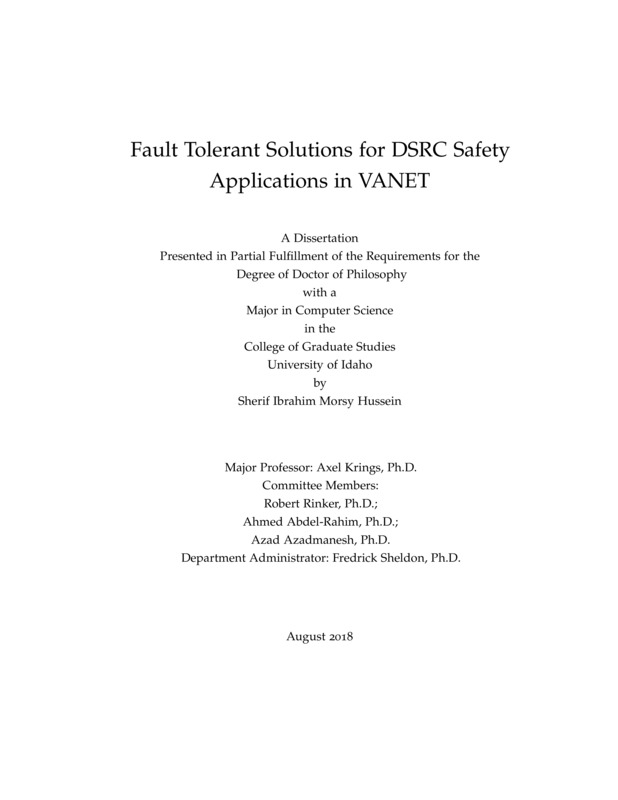Fault Tolerant Solutions for DSRC Safety Applications in VANET
HUSSEIN, SHERIF. (2018-08). Fault Tolerant Solutions for DSRC Safety Applications in VANET. Theses and Dissertations Collection, University of Idaho Library Digital Collections. https://www.lib.uidaho.edu/digital/etd/items/hussein_idaho_0089e_11397.html
- Title:
- Fault Tolerant Solutions for DSRC Safety Applications in VANET
- Author:
- HUSSEIN, SHERIF
- Date:
- 2018-08
- Keywords:
- Clock Synchronization DSRC Safety applications Fault tolerance Jamming Malicious Attack VANET
- Program:
- Computer Science
- Subject Category:
- Computer science
- Abstract:
-
Vehicular Ad Hoc Networks (VANETs) are an emerging technology in Intelligent Transportation Systems (ITS) that aim to enhance traffic efficiency and safety. VANET deploy Dedicated Short Range Communications (DSRC) safety applications that are intended to alert drivers of dangerous road conditions and road hazards, e.g., during low visibility, to reduce accidents. DSRC offers the wireless support for Vehicle-to-Vehicle (V2V) and Vehicle-to-Infrastructure (V2I) communication to form the VANET. This requires that each vehicle be equipped with an On-Board Unit (OBU) and the infrastructure, such as an intersection, be equipped with a Road Side Unit (RSU). DSRC safety applications enable vehicles to exchange status information with their neighbors in a beacon message called Basic Safety Message (BSM). The reliability of safety applications heavily depends on the timely reception of these BSMs. However, DSRC safety applications might be exposed to the full range of malicious attacks associated with wireless technology.
In this dissertation, we concentrate on wireless jamming and GPS time spoofing attacks and their impact on the reliability of safety applications. First, we introduce a new hybrid jammer, that combines the properties of several types of jammers. The new jammer has the capabilities to 1) prevent legitimate nodes from accessing the medium to send their BSMs, and 2) make innocent nodes appear as misbehaving. As a mitigation strategy for this new jammer, we propose a detection algorithm that can differentiate between legitimate nodes subjected to the attack and misbehaving nodes. Then we present a series of algorithms to enhance safety application reliability in the presence of GPS time spoofing attacks. The mitigation strategies are as follows: 1) A decentralize clock synchronization algorithm is introduced that is capable of handling GPS time spoofing attacks; 2) An enhanced clock synchronization algorithm is proposed that considers a more realistic and stronger fault model. Finally, 3) a clock synchronization algorithm is presented that considers a mixed environment consisting of autonomous and connected vehicles in the presence of omission faults.
The proposed clock synchronization algorithms work as an augmentation to the current GPS synchronization protocol. Their effectiveness are demonstrated using laboratory and field experiments, as well as simulations using NS3 and SUMO. Finally, we show that the proposed mitigation strategies enhance the safety applications reliability with no extra hardware nor modifications of existing standards.
- Description:
- doctoral, Ph.D., Computer Science -- University of Idaho - College of Graduate Studies, 2018-08
- Major Professor:
- Krings, Axel
- Committee:
- Rinker, Robert; Abdel-Rahim, Ahmed; Azadmanesh, Azad
- Defense Date:
- 2018-08
- Identifier:
- HUSSEIN_idaho_0089E_11397
- Type:
- Text
- Format Original:
- Format:
- application/pdf
- Rights:
- In Copyright - Educational Use Permitted. For more information, please contact University of Idaho Library Special Collections and Archives Department at libspec@uidaho.edu.
- Standardized Rights:
- http://rightsstatements.org/vocab/InC-EDU/1.0/

